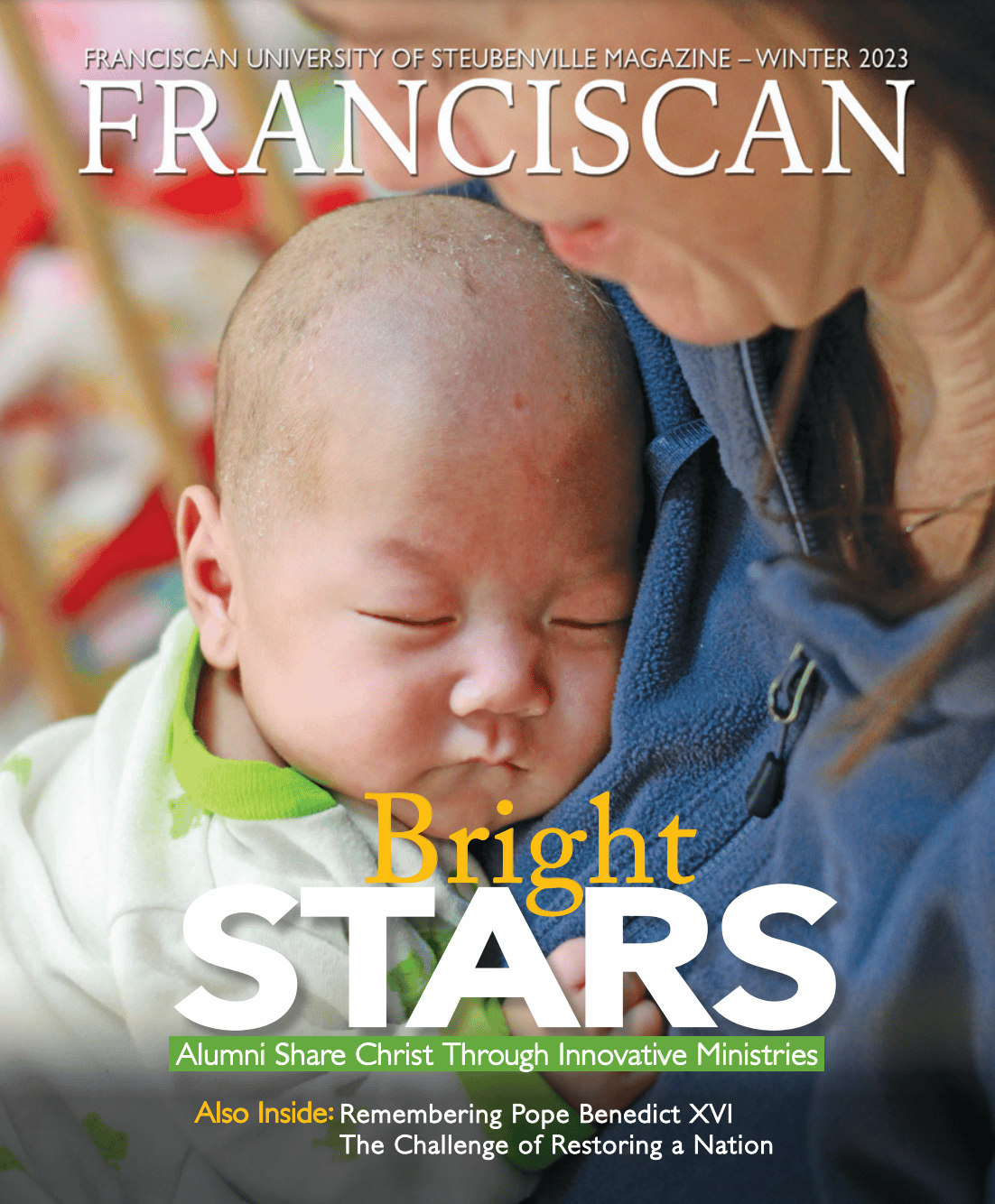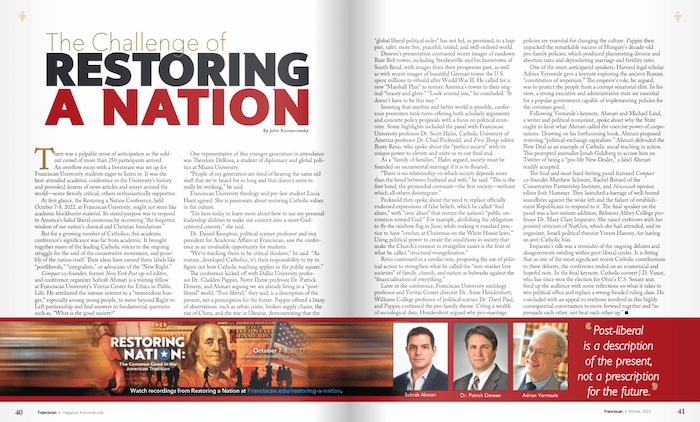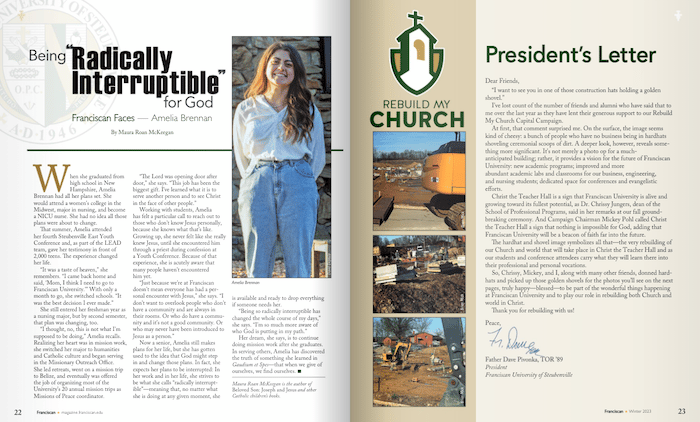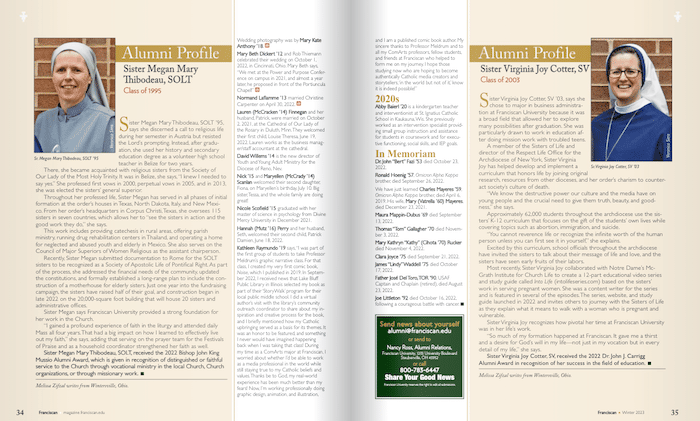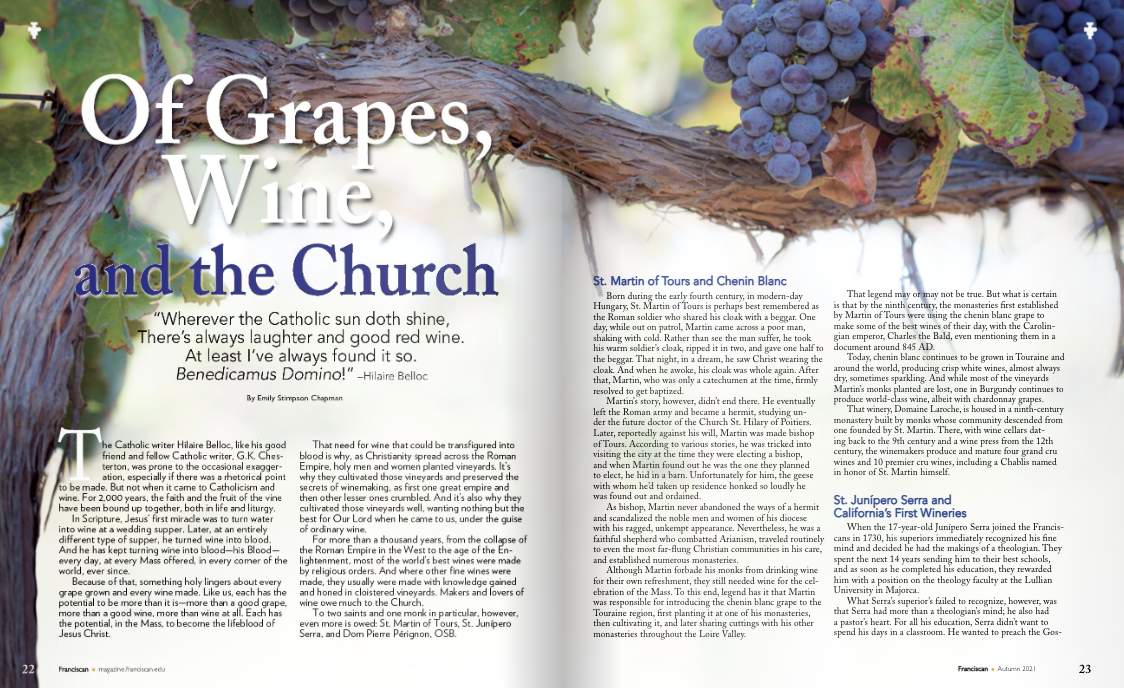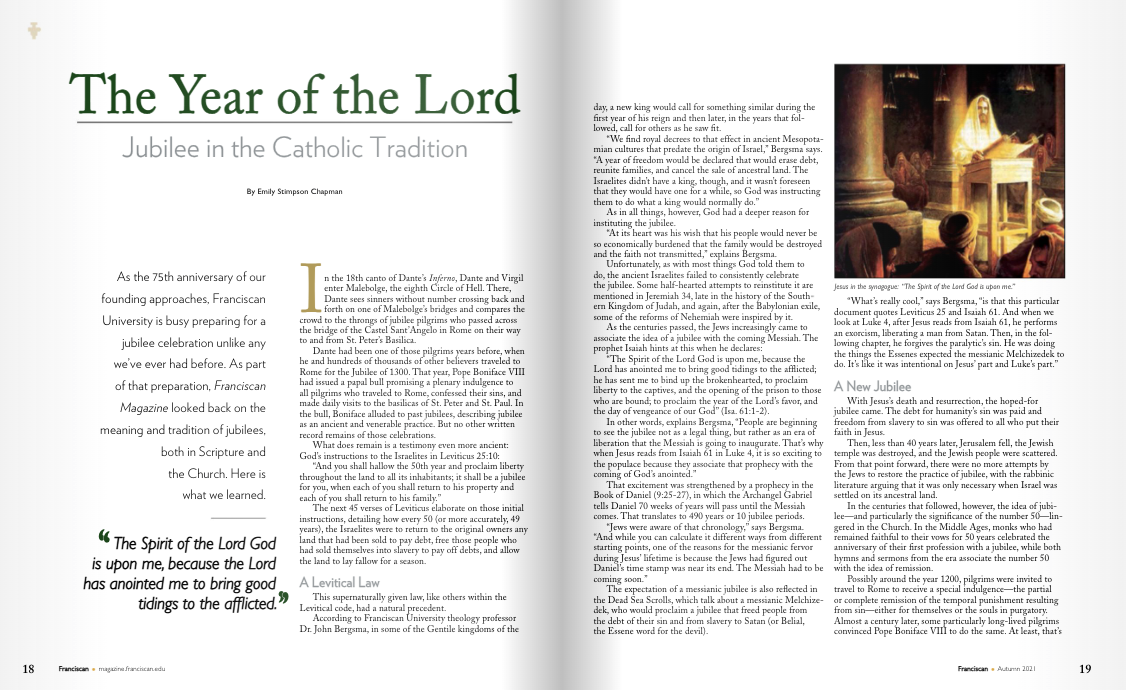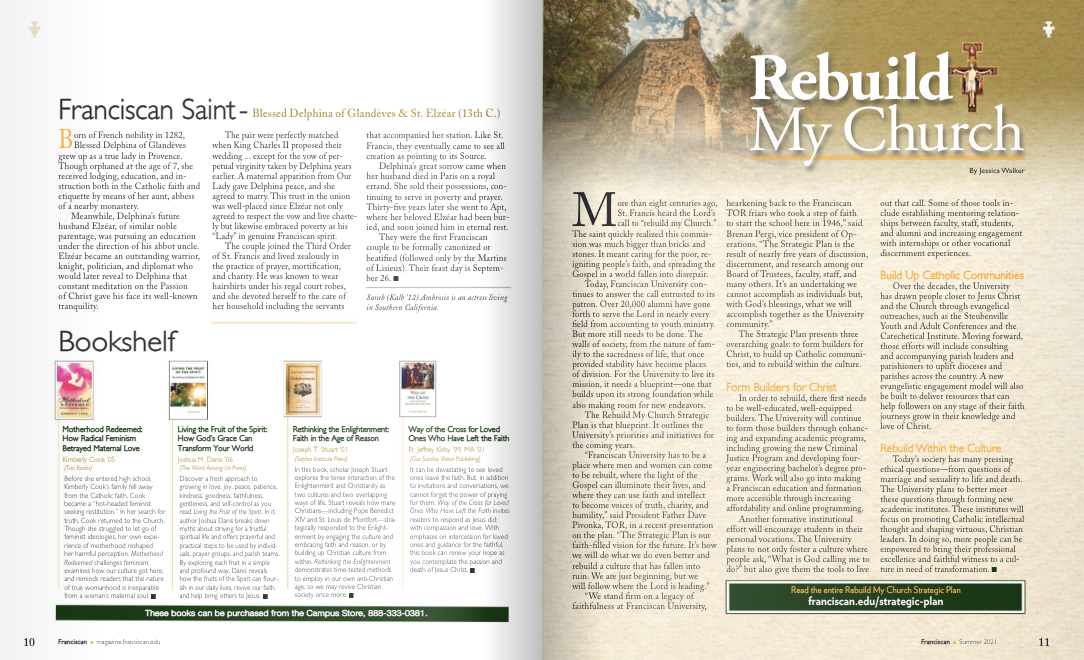There was a palpable sense of anticipation as the sold-out crowd of more than 250 participants arrived. An overflow room with a livestream was set up for Franciscan University students eager to listen in. It was the best-attended academic conference in the University’s history and provoked dozens of news articles and essays around the world—some fiercely critical, others enthusiastically supportive.
At first glance, the Restoring a Nation Conference, held October 7-8, 2022, at Franciscan University, might not seem like academic blockbuster material. Its stated purpose was to respond to America’s failed liberal consensus by recovering “the forgotten wisdom of our nation’s classical and Christian foundations.”
But for a growing number of Catholics, this academic conference’s significance was far from academic. It brought together many of the leading Catholic voices in the ongoing struggle for the soul of the conservative movement, and possibly of the nation itself. Their ideas have earned them labels like “postliberals,” “integralists,” or advocates of the “New Right.”
Compact co-founder, former New York Post op-ed editor, and conference organizer Sohrab Ahmari is a visiting fellow at Franciscan University’s Veritas Center for Ethics in Public Life. He attributed the intense interest to a “tremendous hunger,” especially among young people, to move beyond Right vs. Left partisanship and find answers to fundamental questions such as, “What is the good society?”
One representative of this younger generation in attendance was Theodore DeRosa, a student of diplomacy and global politics at Miami University.
“People of my generation are tired of hearing the same old stuff that we’ve heard for so long and that doesn’t seem to really be working,” he said.
Franciscan University theology and pre-law student Lucia Hunt agreed. She is passionate about restoring Catholic values in the culture.
“I’m here today to learn more about how to use my personal leadership abilities to make our country into a more God-centered country,” she said.
Dr. Daniel Kempton, political science professor and vice president for Academic Affairs at Franciscan, saw the conference as an invaluable opportunity for students.
“We’re teaching them to be critical thinkers,” he said. “As mature, developed Catholics, it’s their responsibility to try to figure out how Catholic teaching applies in the public square.”
The conference kicked off with Dallas University professor Dr. Gladden Pappin, Notre Dame professor Dr. Patrick Deneen, and Ahmari arguing we are already living in a “postliberal” world. “Post-liberal,” they said, is a description of the present, not a prescription for the future. Pappin offered a litany of observations, such as urban crime, broken supply chains, the rise of China, and the war in Ukraine, demonstrating that the “global liberal political order” has not led, as promised, to a happier, safer, more free, peaceful, united, and well-ordered world.
Deneen’s presentation contrasted recent images of rundown Rust Belt towns, including Steubenville and his hometown of South Bend, with images from their prosperous past, as well as with recent images of beautiful German towns the U.S. spent millions to rebuild after World War II. He called for a new “Marshall Plan” to restore America’s towns to their original “beauty and glory.” “Look around you,” he concluded. “It doesn’t have to be this way.”
Insisting that another and better world is possible, conference presenters took turns offering both scholarly arguments and concrete policy proposals with a focus on political economy. Some highlights included the panel with Franciscan University professor Dr. Scott Hahn, Catholic University of America professor Dr. Chad Pecknold, and First Things editor Rusty Reno, who spoke about the “perfect society” with its unique power to elevate and unite us to our final end.
As a “family of families,” Hahn argued, society must be founded on sacramental marriage if it is to flourish.
“There is no relationship on which society depends more than the bond between husband and wife,” he said. “This is the first bond, the primordial covenant—the first society—without which all others disintegrate.”
“Post-liberal is a description of the present, not a prescription for the future.”
Pecknold then spoke about the need to replace officially endorsed expressions of false beliefs, which he called “foul altars,” with “civic altars” that restore the nation’s “public orientation toward God.” For example, abolishing the obligation to fly the rainbow flag in June, while making it standard practice to have “creches at Christmas on the White House lawn.” Using political power to create the conditions in society that make the Church’s mission to evangelize easier is the fruit of what he called “structural evangelization.”
Reno continued in a similar vein, proposing the use of political action to strengthen what he called the “non-market love societies” of family, church, and nation as bulwarks against the “financialization of everything.”
Later in the conference, Franciscan University sociology professor and Veritas Center director Dr. Anne Hendershott, Williams College professor of political science Dr. Darel Paul, and Pappin continued the pro-family theme. Citing a wealth of sociological data, Hendershott argued why pro-marriage policies are essential for changing the culture. Pappin then unpacked the remarkable success of Hungary’s decade-old pro-family policies, which produced plummeting divorce and abortion rates and skyrocketing marriage and fertility rates.
One of the more anticipated speakers, Harvard legal scholar Adrian Vermeule gave a keynote exploring the ancient Roman “constitution of imperium.” The emperor’s role, he argued, was to protect the people from a corrupt senatorial elite. In his view, a strong executive and administrative state are essential for a popular government capable of implementing policies for the common good.
Following Vermeule’s keynote, Ahmari and Michael Lind, a writer and political economist, spoke about why the State ought to limit what Ahmari called the coercive power of corporations. Drawing on his forthcoming book, Ahmari proposed restoring “political-exchange capitalism.” Ahmari defended the New Deal as an example of Catholic social teaching in action. This prompted journalist Jonah Goldberg to accuse him on Twitter of being a “pro-life New Dealer,” a label Ahmari readily accepted.
The final and most hard-hitting panel featured Compact co-founder Matthew Schmitz, Rachel Bovard of the Conservative Partnership Institute, and Newsweek opinion editor Josh Hammer. They launched a barrage of well-honed soundbites against the woke left and the failure of establishment Republicans to respond to it. The final speaker on the panel was a last-minute addition, Belmont Abbey College professor Dr. Mary Clare Imparato. She raised eyebrows with her pointed criticism of NatCon, which she had attended, and its organizer, Israeli political theorist Yoram Hazony, for having an anti-Catholic bias.
Imparato’s talk was a reminder of the ongoing debates and disagreements swirling within post-liberal circles. It is fitting that as one of the most significant recent Catholic contributions to these debates, the conference ended on an ecumenical and hopeful note. In the final keynote, Catholic convert J.D. Vance, who has since won the election for Ohio’s U.S. Senate seat, fired up the audience with some reflections on what it takes to win political office and replace a wrong-headed ruling class. He concluded with an appeal to everyone involved in this highly consequential conversation to move forward together and “to persuade each other, not beat each other up.”
Click here to watch more recordings from the Restoring a Nation Conference.




